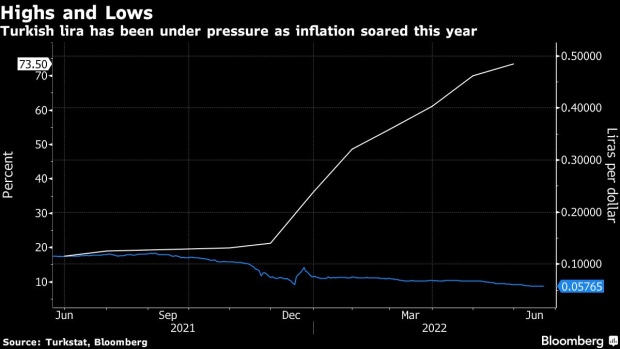Jun 23, 2022
Turkey Taking Its Interest Rates Outlier Status to New Extreme
, Bloomberg News

(Bloomberg) --
Turkey likely won’t deviate from its maverick approach of keeping interest rates deeply below zero when adjusted for inflation even as prices surge, breaking with central banks embarking on what may prove to be the most aggressive tightening of monetary policy since the 1980s.
A pause by the Turkish central bank since it ended a round of rate cuts last year has put added strain on the lira and touched off a surge in consumer prices that Goldman Sachs Group Inc. estimates will soon reach 80%.
But economists are near unanimous that policy makers will keep their benchmark at 14% on Thursday. In a Bloomberg poll of 26 analysts, a lone dissenter predicts a cut of one percentage point, with the rest seeing no change.
“I can’t even imagine where we will end up if current policies continue for another 12 months,” said Hakan Kara, the former chief economist of Turkey’s central bank.
“If we go on like this, we can’t come out of this situation without foreign support,” said Kara, who’s now an economics professor at Bilkent University in Ankara.
The insistence on unprecedentedly loose monetary policy will leave Turkish assets even more vulnerable as domestic price pressures build further and the European Central Bank prepares to join peers by starting to raise rates soon. The lira is the worst performer in emerging markets this year with a loss of more than 23% against the dollar.
But pressure from President Recep Tayyip Erdogan to keep rates low means hikes are off the table for Turkish central bank Governor Sahap Kavcioglu. Instead, policy makers have deployed measures to curb credit growth and make the lira more appealing to savers while trying to rebuild their reserves.
What Bloomberg Economics Says...
“The central bank has recently tightened using alternative tools such as reserve requirements. But in the absence of a higher policy rate, these steps did not anchor inflation expectations, have lasting impact on consumer prices or shoreup the lira.”
The risk isn’t just that the central bank will cling to the already low rates for longer. Further easing may in fact be in play after Erdogan -- long a believer that cheaper borrowing costs can slow inflation instead of pushing it up -- promised this month that rate cuts will continue.
Turkish policy makers have been mindful of the change in course by their counterparts. But in statements after each monthly meeting this year, with little variation, they’ve repeated a line that central banks in advanced economies “still continue their supportive monetary stances.”
It’s a view that hardly holds true now. Globally, more than 60 central banks have raised borrowing costs since the start of 2022.
Just last week, the US Federal Reserve delivered its biggest move since 1994 and Switzerland unexpectedly raised rates the next day. The Bank of England hiked shortly after by 25 basis points for a fifth time and signaled it will soon double the pace.
Stoked by higher commodities prices in the wake of Russia’s invasion of Ukraine, Turkey’s annual inflation was at a 24-year-high of nearly 74% in May, the fastest in the Group of 20 largest economies.
“There is a material risk of a big rate hike in the fourth quarter if energy bills continue to exert pressure on foreign reserves in autumn 2022,” Barclays Plc economists including Ercan Erguzel said in a report.
©2022 Bloomberg L.P.






